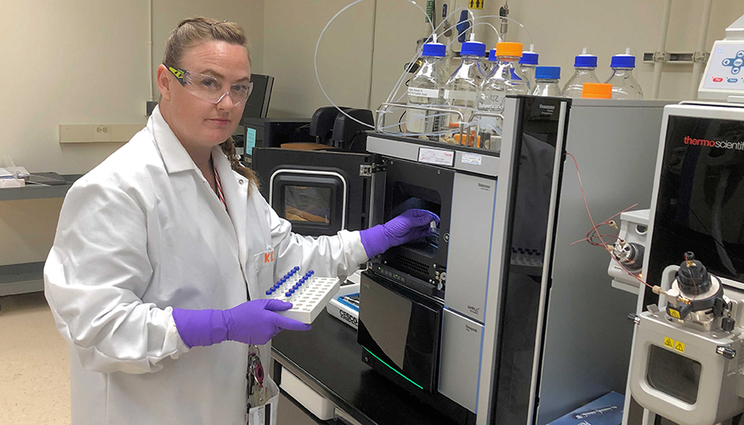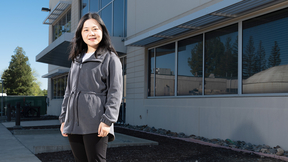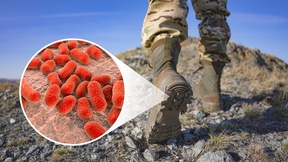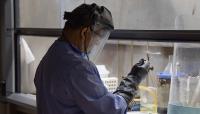LLNL an OPCW-designated lab for biomedical samples
 (Download Image)
(Download Image)
Lab analytical chemist Katelyn Mason loads aqueous proficiency test samples for analysis using a liquid chromatography-triple quadrupole mass spectrometer. Photo by Armando Alcaraz/LLNL.
In addition to maintaining its Organization for the Prohibition of Chemical Weapons (OPCW) laboratory designation for analyzing suspect environmental samples, LLNL also is an OPCW-designated laboratory for the analysis of biomedical samples. (See "Lab earns 'A' in OPCW test)
In this instance, OPCW inspectors have the ability to collect biomedical samples for cases of alleged chemical weapons use, such as the August 2013 sarin attack that occurred in Ghouta, Syria.
The collected biomedical samples are analyzed for the presence, or absence, of unique chemical weapons biomarkers in plasma and urine using advanced/validated analytical methodologies implemented by OPCW biomedical designated laboratories.
LLNL has been an OPCW biomedical designated laboratory since 2016, when the certification process started. To retain the OPCW biomedical designation, labs are required to pass one Biomedical Proficiency Test (BioPT) per year and maintain two “As” or one “A” and one “B” on the two most recent consecutive tests.
See related story: "Lab earns “A” in OPCW test'
During early 2020, LLNL served as the sample preparation laboratory for the 5th BioPT, receiving a provisional “A” grade. (It is expected that the grade will become official in September when the OPCW issues the final report for this proficiency test).
In this role, LLNL Forensic Science Center researchers designed the test scenario, conducted stability studies and participated in the preparation of the samples for shipment to the various international participating laboratories (24 labs) at the OPCW laboratory (The Hague, The Netherlands). LLNL partnered with the OPCW laboratory to prepare the 5th BioPT samples.
“LLNL stands ready to respond 24/7 to assist the OPCW on helping to prevent the use of chemical weapons through its verification capabilities as an OPCW-designated laboratory,” said Armando Alcaraz, the principal investigator for the Lab’s OPCW efforts.
Contact
 Stephen Wampler
Stephen Wampler
[email protected]
(925) 423-3107
Related Links
LLNL Forensic Science CenterOrganization for the Prohibition of Chemical Weapons
See related story: "Lab earns “A” in OPCW test"
Tags
Bioscience and BioengineeringBiosciences and Biotechnology
Advanced Materials and Manufacturing
Materials Science
Nuclear, Chem, and Isotopic S&T
Nuclear and Chemical Sciences
Global Security
Physical and Life Sciences
Featured Articles








